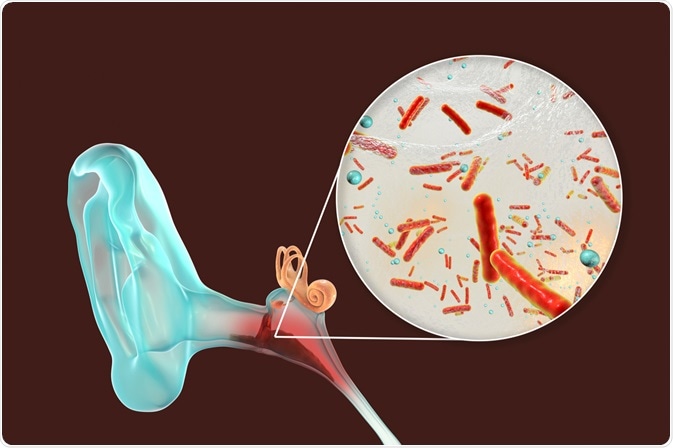Acute otitis media is strongly linked to childhood anatomy, immune function and involves either bacteria or viruses. The season greatly affects the prevalence of the condition, particularly as it is much more common during the colder months when colds and the flu are in circulation.

Image Credit: Kateryna Kon / Shutterstock
Risk Factors
There are several individual characteristics that are known to increase the risk of acquiring otitis media. These include:
- Exposure to smoke, usually with parents that are smokers
- Lack of or insufficient time breastfeeding and subsequent pacifier use
- Attending daycare from an earlier age or for more time
- Predisposition to allergies
- Presence of older siblings
- Native American
- Down syndrome
Upper respiratory tract infections caused by viruses may also lead to otitis media in some cases. Additionally, it is not unusual for an acute middle ear infection to then lead to otitis media with effusion.
Causative Organisms
Bacteria or viruses can be responsible for the growth of the infection in the middle ear and resulting symptoms. For acute otitis media, the bacteria to blame for causing the infection are most frequently:
- Streptococcus pneumonia
- Haemophilus influenzae
- Moraxella catarrhalis
Pathophysiology
All forms of otitis media are usually caused by a dysfunction of the Eustachian tube. In most cases, this occurs as a result of inflammation of the nasopharynx mucous membranes, after an upper respiratory infection or exposure to allergens.
The gas in the middle ear becomes trapped due to the Eustachian tube dysfunction and is gradually absorbed into the tissues that surround the area. Eventually, this causes a negative pressure in the middle ear, which can lead to the fluid being vacuumed into the tympanic cavity in the middle ear.
It is possible for this fluid to then become infected by a virus or bacteria, particularly when it comes into contact with secretions from the nasopharynx. It is often the same virus that caused an initial upper respiratory infection that is responsible for the otitis media.
Prevention
In order to prevent otitis media, it is logical to try and reduce the risk factors that are associated with the condition. Not everything can be managed – such as racial susceptibility and preexisting health conditions – but there are several steps that can be taken to prevent it.
- Reduce smoking in the home by parents
- Minimize daycare attendance or choose a center with fewer attendees
- Increase breastfeeding and use pacifiers less, particularly for the first six months of life.
Additionally, vaccinations for pneumococcal and influenza can help to reduce the risk of upper respiratory infections and the related otitis media. Pneumococcal conjugate vaccines can decrease the incidence of otitis media by 6-7% when given to infants and have the potential to benefit the public health system substantially.
Additional Information
Long-term use of antibiotics to prevent otitis media is associated with the emergence of resistant otitic bacteria. It is for this reason that preventative antibiotics are not recommended.
Zinc supplementation has been proposed as a method of otitis media prevention. However, there is no strong evidence to support this. In some circumstances, such as for young children with severe malnutrition or marasmus, this may prove beneficial.
References
Further Reading